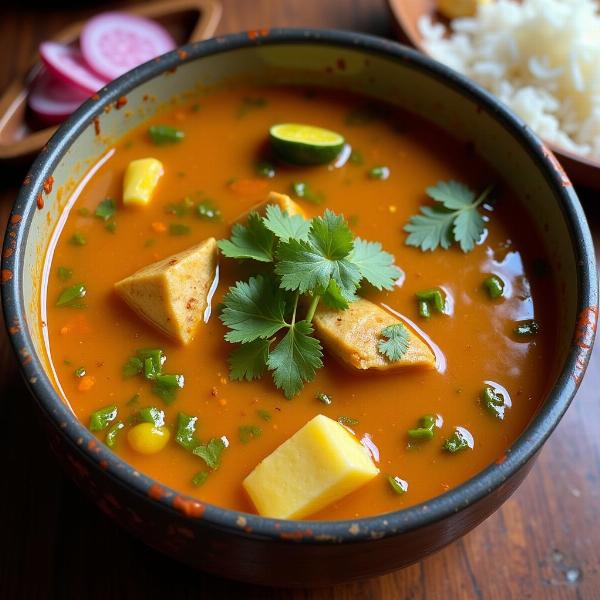Jhol meaning in Hindi encompasses more than just its literal translation. While it primarily refers to a thin, broth-like curry, particularly popular in Bengali and Oriya cuisine, its meaning extends beyond the culinary realm, often carrying cultural and social connotations. Understanding the nuances of “jhol” offers a glimpse into the rich tapestry of Indian traditions and everyday life.
Decoding the Many Meanings of “Jhol”
The word “jhol” (झोल) originates from the Sanskrit word “jhalla,” meaning “to shake or move.” This etymology hints at the characteristic watery consistency of the dish. In Hindi, “jhol” is commonly understood as a light, watery curry, often made with vegetables, fish, or meat. It’s distinct from thicker, richer gravies like “korma” or “masala.” However, “jhol” can also be used colloquially to describe a messy or complicated situation, adding another layer to its meaning.
 Jhol in Bengali Cuisine
Jhol in Bengali Cuisine
Jhol in Bengali and Oriya Cuisine
Jhol holds a special place in Bengali and Oriya cuisine, where it’s a staple dish. These regional variations often feature distinct spice blends and ingredients, reflecting the local culinary traditions. For instance, “macher jhol” (fish curry) is a beloved dish in Bengal, prepared with various fish and a unique blend of spices. Similarly, “aloo jhol” (potato curry) is a simple yet comforting dish, showcasing the versatility of this culinary style.
Beyond the Culinary: “Jhol” in Everyday Language
Beyond its culinary meaning, “jhol” is often used figuratively in Hindi to describe a complicated or messy situation. For instance, one might say, “Yeh kaisa jhol hai?” (What kind of mess is this?), expressing frustration or confusion. This colloquial usage demonstrates how words connected to food can permeate everyday language, reflecting cultural nuances.
Regional Variations and Pronunciation
While the basic meaning of “jhol” remains consistent across Hindi-speaking regions, subtle variations in pronunciation and usage might exist. These nuances often reflect the diverse linguistic landscape of India. Understanding these regional differences further enriches our understanding of the word’s multifaceted nature.
Jhol vs. Other Curry Types: A Comparison
How does “jhol” compare to other types of Indian curries? While “jhol” is characterized by its thin, broth-like consistency, other curries, such as “korma” and “masala,” are typically thicker and richer. This distinction highlights the diverse range of flavors and textures found in Indian cuisine.
Understanding the Cultural Context
Appreciating the cultural context surrounding “jhol” helps us grasp its deeper meaning. In many Indian households, “jhol” is not just a dish but a symbol of comfort, tradition, and everyday life. It’s a taste of home, often passed down through generations, connecting people to their cultural heritage.
Conclusion: More Than Just a Curry
Jhol meaning in Hindi extends beyond its culinary definition, reflecting the richness and complexity of Indian culture. Whether enjoyed as a comforting meal or used to describe a complicated situation, “jhol” is a word deeply ingrained in the linguistic and cultural fabric of India. Understanding its nuances provides valuable insight into the diverse traditions and everyday life of the Indian subcontinent.
FAQ
- What is the main difference between jhol and other Indian curries? Jhol is a thin, broth-like curry, while other curries like korma and masala are typically thicker and richer.
- What is macher jhol? Macher jhol is a popular Bengali fish curry made with a unique blend of spices.
- Can “jhol” be used in a non-culinary context? Yes, “jhol” can colloquially refer to a messy or complicated situation.
- Where does the word “jhol” originate from? It comes from the Sanskrit word “jhalla,” meaning “to shake or move.”
- Is jhol a common dish in all parts of India? It’s particularly popular in Bengali and Oriya cuisine.
- What does “Yeh kaisa jhol hai?” mean? It means “What kind of mess is this?”
- What are some common ingredients used in jhol? Vegetables, fish, and meat are common ingredients, along with various spices.
Meaning-Hindi.in is your premier destination for professional Hindi translation services. We specialize in a variety of translation needs, including business and commercial documents, legal and certified translations, technical manuals, website localization, educational and academic materials, and expedited translation services. Our expertise covers a wide range of specialized fields, ensuring accurate and culturally sensitive translations. Contact us today for all your Hindi translation requirements at [email protected] or call us at +91 11-4502-7584. Meaning-Hindi.in is committed to delivering high-quality translations that bridge language barriers and connect cultures.